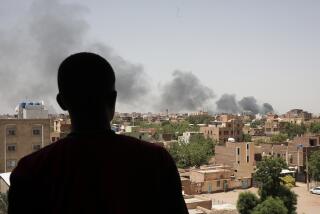U.S. Captive Shown on Videotape
- Share via
BAGHDAD — Grainy video of a frightened-looking 20-year-old American soldier, wearing camouflage and surrounded by five masked men, aired Friday on Arabic satellite TV channel Al Jazeera.
“My name is Keith Matthew Maupin. I am a soldier from the 1st Division,” he said into the camera. “I am married with a 10-month-old child. I came to liberate Iraq, but I did not come willingly because I wanted to stay with my child.”
Maupin, of Batavia, Ohio, was one of two soldiers listed as missing after their convoy was attacked April 9 outside Baghdad during a spate of kidnappings that targeted foreigners. The other missing soldier is Sgt. Elmer C. Krause, 40, of Greensboro, N.C. Both were assigned to the Army Reserve’s 724th Transportation Company, based in Bartonville, Ill.
A spokesman for Maupin’s parents in Ohio said the man on the tape was their son and they were praying for his safe return.
Seven civilians, all employees of American contractor KBR, a subsidiary of Halliburton Co. that was formerly known as Kellogg, Brown & Root, also were reported missing after the convoy attack, in which a fuel tanker was torched.
Maupin glanced down occasionally during the taping. The gunmen, their faces covered by kaffiyehs, stood behind him. According to Al Jazeera, one gunman said they were keeping Maupin to be exchanged for prisoners captured by American forces.
Earlier in the day, three Czech journalists and a Syrian Canadian aid worker were released by their captors, while two other civilians, a Danish businessman and a man from the United Arab Emirates, were reported missing.
The filming of the soldier capped a day of up-and-down negotiations over two Iraqi hot spots, with U.S. officials meeting for the first time with leaders from the city of Fallouja while skirmishes broke out near the southern Shiite Muslim holy city of Najaf between American troops and a militia loyal to cleric Muqtada Sadr.
The steps toward a peaceful solution in Fallouja, where Marines are seeking the men who killed and then mutilated the bodies of four American civilian contractors late last month, came as fighting continued around the city. A U.S. plane dropped a 2,000-pound bomb in response to insurgent fire, and military commanders were increasingly restive about respecting a tenuous cease-fire that has stretched into its seventh day.
The cease-fire was brokered last week by a delegation from the Iraqi Islamic Party and aides to members of the Iraqi Governing Council, who met with local leaders in Fallouja. On Friday, representatives of the U.S. military and the civilian authority running Iraq joined the delegation for meetings in Fallouja.
The talks are “our way of showing our seriousness in terms of minimizing bloodshed,” said Dan Senor, a spokesman for the U.S.-led coalition.
But he added his voice to those of commanders who have expressed impatience with the cease-fire in recent days. “Our Marines have been on the receiving end of shots and attacks over the past week, and all the while the enemy continues to strengthen its defensive position,” he said.
The peril the coalition faces in stepping up its military operations was evident Friday, when a representative of the Muslim Clerics Assn., the influential group that helped negotiate the release of three Japanese hostages this week, called for resistance to the occupation.
The call for resistance -- not necessarily by violent means -- was made at a Baghdad news conference, where Abdel Salam Kubaisi said that U.S. actions in Fallouja, where 600 Iraqis are said to have died, requires a response.
“This can be a peaceful resistance,” Kubaisi said. “It can be by the simple throwing of rocks; it depends on the person, to get rid of the attacker.”
Meanwhile, south of Baghdad in Kufa, anti-American cleric Sadr continued to issue fiery rhetoric against the occupation, vowing to resist Iraq’s invaders.
Wearing a white funeral shroud to signify his willingness to die, Sadr told thousands of chanting supporters at a mosque that “the Iraqi people will not remain repressed.”
To the American forces, he said, “If you are not afraid of God, be afraid of the Iraqi people.”
As U.S. fighter jets screamed overhead, hundreds of black-garbed and heavily armed members of Sadr’s militia, who have battled coalition forces this month, stood close to him as he spoke.
Tension grew in the neighboring holy city of Najaf, where a representative of Shiite Muslims’ most revered leader, Grand Ayatollah Ali Sistani, warned of a “red line” around the holy cities of Najaf and Karbala that coalition forces should not cross in seeking Sadr on a murder warrant.
Sadr’s militia seized Najaf two weeks ago, but by Friday it had vanished from the streets and Iraqi police were back in their stations. In his sermon, Sadr said the police were now loyal to him.
Several Shiite religious and political leaders are serving as go-betweens with Sadr and the coalition. Also involved is a delegation of Iranians. Sadr has some supporters in Iran, but the Iraqi national has criticized local religious leaders with Iran ties.
U.S. officials Friday continued to insist that they had not requested help from Iran, a longtime enemy, in resolving the standoff with Sadr. “There is no role for the Iranians to play middleman in the Sadr situation,” Senor said.
He added that the U.S. is respectful of Najaf’s exalted standing in Islam. “Najaf is not the target,” Senor said. “Muqtada Sadr is the target.”
Riccardi reported from Baghdad and Hendren from Washington. Special correspondent Saad Fakr Deen in Najaf contributed to this report.
More to Read
Sign up for Essential California
The most important California stories and recommendations in your inbox every morning.
You may occasionally receive promotional content from the Los Angeles Times.













